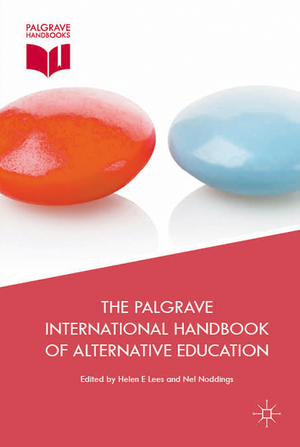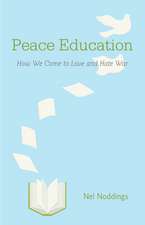The Palgrave International Handbook of Alternative Education
Editat de Helen E. Lees, Nel Noddingsen Limba Engleză Hardback – 7 sep 2016
This state-of-the-art, comprehensive Handbook fully explores the field of alternative education on an international scale. Alternatives to mainstream schooling and education are becoming increasingly recognised as pertinent and urgent for better understanding what really works in successfully educating children and adults today, especially in light of the increased performance driven and managerially organised economic modelling of education that dominates. For too long we have wondered what “exactly” education done otherwise might look like and here we meet individual examples as well as seeing what alternative education is when a collection becomes greater than the sum of parts. The Handbook profiles numerous empirical examples from around the world of education being done in innovative and excitingly democratic and autonomous ways from Forest Schools and Home Education through to new technologies, neuroscience and the importance of solitude. The book also setsout important theoretical perspectives to inform us why seeing education through an alternative lens is useful as well as urgently needed.
Global in its perspective and definitive in content, this one-stop volume will be an indispensable reference resource for a wide range of academics, students and researchers in the fields of Education, Education Policy, Sociology and Philosophy as well as educational practitioners.
Preț: 1410.07 lei
Preț vechi: 1719.60 lei
-18% Nou
Puncte Express: 2115
Preț estimativ în valută:
269.83€ • 278.79$ • 224.46£
269.83€ • 278.79$ • 224.46£
Carte tipărită la comandă
Livrare economică 19 martie-02 aprilie
Preluare comenzi: 021 569.72.76
Specificații
ISBN-13: 9781137412904
ISBN-10: 1137412909
Pagini: 480
Ilustrații: XIX, 505 p. 19 illus., 6 illus. in color.
Dimensiuni: 155 x 235 x 29 mm
Greutate: 9.1 kg
Ediția:1st ed. 2016
Editura: Palgrave Macmillan UK
Colecția Palgrave Macmillan
Locul publicării:London, United Kingdom
ISBN-10: 1137412909
Pagini: 480
Ilustrații: XIX, 505 p. 19 illus., 6 illus. in color.
Dimensiuni: 155 x 235 x 29 mm
Greutate: 9.1 kg
Ediția:1st ed. 2016
Editura: Palgrave Macmillan UK
Colecția Palgrave Macmillan
Locul publicării:London, United Kingdom
Cuprins
Introduction; Nel Noddings.- This Handbook; Helen E Lees.- Section 1: Thinking Differently.- Chapter 1: The Mind of the Educator; Kris De Meyer; Chapter 2: an ordinary day; Philipp Klaus.- Chapter 3: Mother Nature’s Pedagogy: How Children Educate Themselves; Peter Gray.- Chapter 4: Using the Future in Education: Creating Space for Openness, Hope and Novelty; Keri Facer.- Chapter 5: Promise and Peril of Neuroscience for Alternative Education; Clarence W. Joldersma.- Chapter 6: What Might Have Been: Women’s Traditional Interests; Nel Noddings.- Chapter 7: Psychoanalysis and the challenge of educational fantasies; Roger Willoughby and Hivren Demir Atay; Chapter 8: Great Expectations: Agenda and Authority in Technological, Hidden and Cultural Curriculums; Harriet Pattison & Alan Thomas.- Chapter 9: Alternatives to Education? Impotentiality and the Accident: New Bearings in the Ontology of the Present; Nick Peim.- Chapter 10: Educational Mutuality; Helen E Lees.- Section 2: Doing Differently.- Chapter 11: Home Education: Practices, Purposes, and Possibilities; Rob Kunzman.- Chapter 12: School Ethics with Student Teachers in South Africa: An Innovative Educational Intervention; Karin Murris.- Chapter 13: Innovative Experiences in Holistic Education Inspiring a New Movement in Brazil; Helena Singer.- Chapter 14: Learning at the Edge of Chaos—Self-Organising Systems in Education; Sugata Mitra, Suneeta Kulkarni & James Stanfield.- Chapter 15: Fostering Alternative Education in Society—A Caring Community of the “Children’s Dream Park” and “Free Space En” in Japan; Yoshiyuki Nagata.- Chapter 16: Teacher Education—Generator of Change or a Mechanism for Educational Conformity?; Ian Menter.- Chapter 17: Philosophy with Children: An Imaginative Democratic Practice; Joanna Haynes.- Chapter 18: Forest School: A Model for Learning Holistically and Outdoors; Sara Knight.- Chapter 19: Creating Spaces for Autonomy: The Architecture of Learning and Thinking in Danish Schools and Universities; Max A. Hope & Catherine Montgomery.- Section 3: Acting Differently.- Chapter 20: Exploration and Rethinking: Student-Voice Studies in China; Wei Kan.- Chapter 21: Islamic Education as Asymmetrical Democratic Interaction; Khosrow Bagheri Noaparast.- Chapter 22: Is Low Fee Private Schooling in Developing Countries Really An “Alternative”?; Clive Harber.- Chapter 23: Humanist Schools in the Face of Conflicting Narratives and Social Upheaval – The Case of Israel; Nimrod Aloni.- Chapter 24: Geographies of Trust: A Politics of Resistance for an Alternative Education; John Smyth.- Chapter 25: Alternatives to School Sex Education; Michael J. Reiss.- Chapter 26: Critical Animal Pedagogies: Re-learning our Relations with Animal Others; Karin Gunnarsson Dinker & Helena Pedersen.- Chapter 27: Solitude and Spirituality in Schooling: The Alternative at the Heart of the School; Julian Stern.- Chapter 28: German Kinderlaeden: From Alternative Projects to Professional Pedagogy; Robert Hamm.- Chapter 29: Attachment Aware Schools: An Alternative to Behaviourism in Supporting Children’s Behaviour?; Richard Parker, Janet Rose & Louise Gilbert.
Recenzii
“An ‘International Handbook of Alternative Education’ is indeed timely, given the intensifying critiques of global education systems. ... for a broader range of professionals and adults concerned with the mental, physical, moral and spiritual welfare of young people.” (David Leat, Other Education - The Journal of Educational Alternatives Volume, Vol. 7 (1), 2018)
“The Palgrave International Handbook of Alternative Education is a much friendlier and accessible text … . I think the real strength of this book is its diversity of research, writing styles and countries covered … . I think this book fills a much needed gap in the market of diverse and rigorous academic and practitioner research into alternative education and I would recommend it to students, academics and parents interested in learning more about educating differently.” (Alys Mendus, Journal of Unschooling and Alternative Learning, Vol. 10 (21), 2017)
“The Handbook convinces that the value of alternative education lies not just in the benefits it may provide to particular groups of learners who are engaging with it at any point in time. Rather, its ultimate value is in the challenge it can provide, to disrupt existing ways of thinking, doing and acting. For this reason, it is an essential read for all educators.” (Nicola Kemp, British Journal of Educational Studies, September, 2017)
Notă biografică
Helen E Lees is Lecturer in Education Studies at Newman University, UK and founding Editor-in-Chief of Other Education – The Journal of Educational Alternatives. Her latest monograph is Education Without Schools - Discovering Alternatives (Policy Press, 2014).
Nel Noddings is Jacks Professor Emeriti of Child Education at Stanford University, USA. She is a highly published, globally renowned philosopher of feminism, education and care.
Nel Noddings is Jacks Professor Emeriti of Child Education at Stanford University, USA. She is a highly published, globally renowned philosopher of feminism, education and care.
Textul de pe ultima copertă
This state-of-the-art, comprehensive Handbook fully explores the field of alternative education on an international scale. Alternatives to mainstream schooling and education are becoming increasingly recognised as pertinent and urgent for better understanding what really works in successfully educating children and adults today, especially in light of the increased performance driven and managerially organised economic modelling of education that dominates. For too long we have wondered what “exactly” education done otherwise might look like and here we meet individual examples as well as seeing what alternative education is when a collection becomes greater than the sum of parts. The Handbook profiles numerous empirical examples from around the world of education being done in innovative and excitingly democratic and autonomous ways from Forest Schools and Home Education through to new technologies, neuroscience and the importance of solitude. The book also sets out important theoretical perspectives to inform us why seeing education through an alternative lens is useful as well as urgently needed.
Global in its perspective and definitive in content, this one-stop volume will be an indispensable reference resource for a wide range of academics, students and researchers in the fields of Education, Education Policy, Sociology and Philosophy as well as educational practitioners.
Caracteristici
Explores how education needs to be re-invented and be child-centred Profiles numerous global empirical examples of innovative, democratic and autonomous education Offers theoretical perspectives on education through an alternative lens














